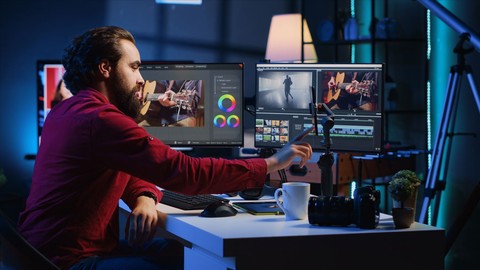Mastering Editor Scripting in Unity
What you’ll learn
- Introduction to Editor Scripting: Understanding the fundamentals and importance of editor scripting in Unity.
- Creating Custom Inspectors: How to create custom inspectors to modify and enhance the Unity Editor interface.
- Integrating GUI Tools: Using GUI tools effectively to create intuitive interfaces for level editors and tools.
- Managing Editor Modes: Implementing different editor modes to streamline workflow and enhance productivity.
- Advanced Gizmos and Handles: Utilizing Gizmos and Handles classes to visualize and interact with game objects in the editor.
- Custom Property Drawers: Creating custom property drawers to enhance the editing experience for specific game components.
- Building DLLs: Building and utilizing DLLs to extend Unity’s functionality and manage larger projects efficiently.
- Texture Importer Automation: Automating texture importing processes to standardize asset management.
- Version Control Integration: Integrating version control systems like Git for collaborative development and project management.
- Creating Custom Editor Tools: Developing specialized editor tools such as object modifiers and scene management tools to streamline game development tasks.
Welcome to “Mastering Editor Scripting in Unity”! This comprehensive course is designed to take you from a beginner to an advanced level in creating custom tools and extensions within the Unity Editor. Whether you are a game developer looking to streamline your workflow or a programmer aiming to enhance your Unity skills, this course will equip you with the knowledge and practical experience needed to create powerful, custom editor scripts. You’ll start with the basics, progress through intermediate techniques, and finally, master advanced concepts to fully unlock the potential of editor scripting in Unity. Join us and transform your Unity development experience!
Section 1: Editor Scripting in Unity – Beginners
In this section, you will be introduced to the foundational concepts of editor scripting in Unity, a powerful feature that allows developers to extend and customize the Unity Editor to enhance productivity. Starting with simple “Hello World” examples, you’ll gradually progress to creating more complex scripts that interact with game objects and help in building test levels. You’ll explore the basics of the Gizmos class for visualizing and debugging within the Unity Editor and begin developing a custom Level Creator Tool to streamline your level design workflow. By the end of this section, you’ll have a solid understanding of how to use editor scripts to improve your development process in Unity.
Section 2: Editor Scripting in Unity – Intermediate
Building on the foundational knowledge from the beginner section, this intermediate section delves deeper into more advanced editor scripting techniques. You’ll learn how to create and manage custom inspectors, property drawers, and decorator drawers to enhance the functionality and usability of your tools. This section also covers the integration of the Palette Window with the inspector and introduces different editor modes and GUI styles. By the conclusion of this section, you will be adept at creating sophisticated editor tools and custom interfaces, making your development process more efficient and tailored to your needs.
Section 3: Editor Scripting in Unity – Advanced
In the advanced section, you will tackle the most complex aspects of editor scripting in Unity. This includes adding build features, working with version control systems like Git, and developing comprehensive object modifier tools. You’ll explore the creation of custom search functionalities, prefab replacement systems, and advanced GUI components. This section also covers the distribution of your custom tools, ensuring they are polished and ready for use in larger projects. By the end of this section, you will have mastered the art of editor scripting in Unity, equipped with the skills to create powerful, custom tools that significantly enhance your game development workflow.
Conclusion
By completing this comprehensive course on Editor Scripting in Unity, you will have transformed from a novice to an advanced user, capable of creating sophisticated editor tools and custom workflows. The skills acquired will not only streamline your development process but also enable you to tackle more complex projects with efficiency and confidence. Whether you are an aspiring game developer or a seasoned professional, this course will equip you with the necessary tools to elevate your Unity development experience to the next level.
Who this course is for:
- Unity Developers: Developers who want to enhance their workflow by creating custom tools and extensions within the Unity Editor.
- Game Programmers: Programmers interested in automating repetitive tasks and optimizing development processes in Unity.
- Intermediate Unity Users: Users with a foundational understanding of Unity who want to deepen their knowledge and capabilities within the editor.
- Students and Learners: Individuals pursuing game development or software engineering careers who want to specialize in Unity development.
- Professionals in Game Development: Professionals seeking to streamline their workflow and increase productivity through custom editor tools.
- Technical Artists: Artists with a technical background or interest in scripting who want to create tools to assist in art asset management and scene setup.
- Indie Game Developers: Indie developers looking to leverage Unity’s flexibility by creating tailored tools and workflows for their projects.
User Reviews
Be the first to review “Mastering Editor Scripting in Unity”
You must be logged in to post a review.







There are no reviews yet.